“Everyone here’s a fucking idiot,” says Wheeler Walker, Jr., of the artists and fans flocking to the 2016 CMT Awards. Evidence of this idiocy lies in the fact that his album isn’t selling nearly as well as (for example) Blake Shelton’s, even though Walker—unlike just about everyone else in the building, he explains—is a real country singer.
When I ask about the relationship between mainstream country’s authenticity problem and its paucity of female voices, Walker—who begins one song Every woman that I meet is a headache and another You ain’t much to look at—assures me he is “more pro-woman than anyone here.” I take “here” to mean the awards show, but it’s possible, given his refreshing hubris, that he means the entire city of Nashville, or the country, or the world. Either way, I refrain from pointing out the actual women in the room, who might sit just a rung or two above him.
After clarifying that his superlative status is due to letting women dump his sorry ass all over the southlands—“I’ve given them so much material”—Walker lets me steer the conversation back to the appalling lack of female voices on country radio. “To me, all the great records coming out right now are being made by women,” he says, and I should mention: I think he means it. We’ve been talking for almost ten minutes on CMT’s neon-pink carpet (“It’s less stuffy than red!” a singer I can’t name aw-shucks for the camera crew next to me). By my next interview, and the ones after that—platitude-laced and predictable, with few exceptions—I’ll come to miss him desperately.
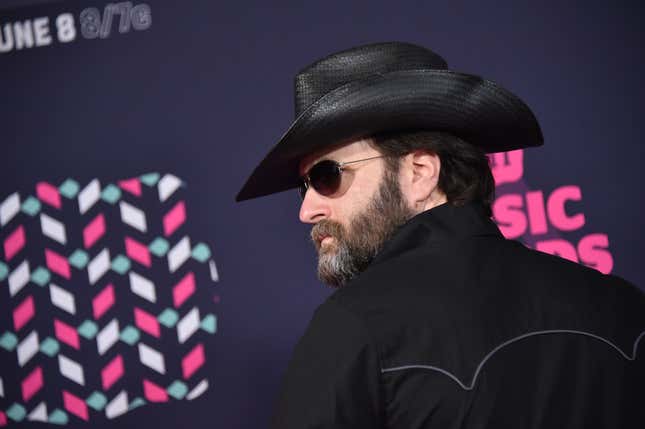
Walker is accompanied by his manager, a man with thin-rimmed glasses and a waist-length, white-blond beard, who seems entirely unfazed by his client’s bombast. As Walker wanders off, his manager picks up the thread of my last question, about country music’s obsession with authenticity, in both lyrics and life.
“I call it the train paradox,” he says. “Back in the ‘20s and ‘30s, if you were a blues musician and you saw a train go across the field, and your life was shit—you were hot and working your ass off—the train was a tangible metaphor. Like, if I could be on that train, it’d be going somewhere, probably, better than this. But if you’re singing about a train today, it’s this inferred authenticity: I want to be authentic, so I’m going to sing about what other people, who were authentic, sing. But that’s not—it’s refracted authenticity.”
When I ask about ways out of this, about how to write and sing genuinely in a genre where genuine-ness is packaged and commodified, he shrugs. “Does it flow from your real experience or does it not, ultimately? I think that people like Jason Isbell or Sturgill Simpson—” He names two artists beloved by those who eschew mainstream country. “They don’t read from outside of themselves, like, I’m going to sing about this because it’ll play well. They don’t even think about that. It’s inside-out, as opposed to outside-in.”
The night before the CMTs in early June, I meet a friend-of-a-friend named Tim at Dino’s, a bar that looks like a diner—long and thin and grungy as a railcar—but for the amps and mic stands taking up half the space. We order burgers and beers at the counter before Tim leads me from the inside out, past the bathrooms and through a sticking screen door to what he calls the patio, though it’s just a back lot, a few picnic tables pressing their weight onto the gravel. Dino’s used to be a total dive—“the freezer was full of rats,” Tim says, cheerfully, as I bite into my cheeseburger—but it’s under new ownership. It’s the first place to go in East Nashville, he assures me.
Tim moved here from his home state of Maine a few years ago. He reminds me of the boys I grew up with in Massachusetts, cousins and friends and sons of my parents’ friends: frank and funny and goodhearted, able to make a living with his hands. He recently quit a touring gig and is working at The Hermitage, Andrew Jackson’s house, doing reconstruction on the windows.
“What’s that like?” I ask.
“Lots of angry ghosts,” he grins, and pulls an honest-to-god handkerchief from his pocket to wipe the burger grease from his hands.
Tim’s girlfriend Jess joins us as the sky grows dark, sipping a shot of tequila along with her beer. She’s been cleaning all day, prepping her house for Airbnb guests: thousands of out-of-towners, like me, are descending on the city for the week’s triple-threat of CMT Awards, CMA Fest, and Bonnaroo. Other than Jess’s house guests, however, there’s little sign of the impending madness on this side of the river. It’s just Tuesday night in East Nashville, and we elbow our way back into and then out of Dino’s through a suddenly packed house: Jim Oblong, Paul Simon’s drummer, is playing a set.
It’s a warm, windows-down kind of night, and Jess’s ancient Volvo, missing a muffler, roars down Gallatin Avenue. We’re bound for the American Legion hall, where Tuesdays are Honky Tonk Night. I’ve picked a good time to visit: the band playing tonight, Tim tells me, as casually as he’d mentioned Andrew Jackson or the freezer rats, is the best band in Nashville.
On the CMTs’ painfully pink carpet, Maggie Rose smiles at me beneath the heavy drapes of her fake lashes. “I’m a big fan,” I say, for the first and only time that evening, and mean it. “I’m a big fan, too,” she says, gesturing to the JEZEBEL sign taped to the carpet at my feet. “If you’re talking to any women here in Nashville, who deal with what we deal with, we like you guys.”
Rose has been in Nashville since she was 19, long enough to have changed labels and names. She used to be Margaret Durante—I’m partial to “Whiskey and a Gun,” off then-Durante’s first digital EP—and the rebranding makes me think of the way professional wrestlers are packaged, with gimmicks and catchphrases. Behind Rose, publicists speed up and down the hall like harried stage moms, pushing squares of cardstock on the members of the press. Each card contains the artist’s bullet-pointed list of accomplishments, but I fixate on the names, short and snappy and chant-able: Kane Brown, Chase Bryant, Chris Lane, Meghan Linsey, Brooke Eden, Dustin Lynch.

Rose and I commiserate about the difficulty women face getting played on country radio; she tells me there are currently four women in the Top 30. “Four out of thirty is pretty shitty, if you ask me,” she says.
“Is there something to be said for being angry?” I ask.
“Yes, absolutely.” Her tone is forceful and thoughtful, her eagerness to speak with a like-minded writer tempered by the complex shape of the problem. I can sense her feeling her way around its jagged edges. “If it weren’t for the political imbalance,” she continues, “I really don’t think I would have found my voice the way that I’ve found it now—I’ve gotten into producing.” She produced her latest EP, The Variety Show, Vol. 1. “Had I gotten through earlier with the music I was making, I would be happy. But I wouldn’t be fulfilled.”
When I ask if she thinks we’ll see the monotone of country radio change anytime soon, she nods. “I do,” she says, though I’m not sure either of us is convinced. She tells me about the songwriters she knows, those who’ve written thousands upon thousands of songs only to have the bro-country stuff recorded, and the rest ignored. “The trends need to change,” Rose says. “Our fans are really smart. I think that if we gave them more variety, they would like it. But we’re scared.”
“Yeah,” I say. “People have embraced artists like Margo Price or Sturgill Simpson or—“I wave down the carpet, where I think I’ve seen his hat bobbing—“Chris Stapleton, obviously.”
“That, to me, is so funny, because those three artists aren’t really getting radio play,” Rose reminds me. “But I would categorize them as more authentically country than, you know, someone labeled as a country artist who’s getting a lot of radio play. And I’m not throwing stones, either, because we’re all trying to make it…” She pauses. I nod and try not to drop my unwieldy pile of papers, my phone.
“Country radio is not country, necessarily,” she concludes. “They’re not interchangeable.” And then, shrugging: “But things are going to get better, because there’s talent. There’s a lot of talent here.”
There’s a lot of talent at American Legion Post 82, and the band playing is just the beginning. A man whose salt-and-pepper mustache curls beatifically into his mouth nods to a table behind me. “That guy has a Grammy,” he says. I have my notebook out, and several strangers are kind enough to tell me who I should be writing down. “That’s Josh Hedley,” the man adds, nodding at another. “You should fuck with him and pretend to know who he is; it’d be funny.” Then, repentant: “He is really good.”
Almost everyone I meet plays an instrument or several, and the few who don’t are otherwise artistically inclined: a woman named Laura Partain takes beautiful photographs; Jess makes bright and earthy pieces of pottery. Upon entering, Jess and I sign our names in the Legion’s guest ledger—Tim has already darted ahead, having spotted friends—and the woman guarding the ledger welcomes us to the hall. “It’s not usually this crowded,” Jess says—we’d had to park her Volvo on a stretch of grass in the middle of the paved parking lot.
The Legion’s front room holds a small bar and cafeteria tables under fluorescent lights. Every man in the place wears a hat, either trucker or cowboy. The bartenders are my mom’s age and call everyone “honey”; they, in turn, are “sweetheart” to the even older men ordering whiskey and beer. I keep gushing to Jess and Tim and their revolving circle of friends. “I love this place.” To be fair, I’m a little tipsy. To be fair, the place is easy to love.
The American Legion was founded in 1919 in Paris, where thousands of American soldiers awaited their return to the States after World War I. Morale among the homesick, war-weary soldiers was low, so a group of officers—led by Theodore Roosevelt, Jr.—formed the organization to maintain camaraderie, relax regulations, and provide athletics, entertainment, and other recreational activities for the becalmed troops. Almost 15,000 posts exist today, serving more than two million veterans and active service members.
Not a single person at Post 82 is interested or impressed by the fact that I’ll be attending the CMTs tomorrow. Instead, without exception, they display deep and genuine sympathy: That’s too bad, you have to waste a whole night doing that? I’m accepting yet another person’s condolences when Tim reappears at my side, nodding down the darkening hallway behind the bar, towards the back room.
“There’s some quality country music going on,” he says.
The best band in Nashville plays on a small stage under the slow rotation of a disco ball and the soft glimmer of Christmas lights. 20 circular tables surround a dance floor the width of just a few tables more, where three or four couples toe slowly to the country sounds of the 1940s and ‘50s, as rendered by Chris Scruggs and the Stone Fox Five. Backed by fiddle and steel, hair slick under his hat, Scruggs plays the part of a classic showman down to his diction. “If you take a notion to dance,” he says, gently, as the band picks up the tempo, “don’t fight the urge.”
Earlier in the day, I’d worried that my cowboy boots branded me a tourist—and they probably did, downtown—but boots and bolo ties and vests abound at the Legion. A fiddler wears a jacket more fringe than fabric. These are trappings, but I can’t help thinking that the trappings matter, that part of country’s internal strife can be summed up in the preponderance of sneakers and heels. So many of mainstream country’s stars don’t bother to look—or to sound—the part. “That stuff should be called southern pop,” one of the Legion’s attendees tells me, of the radio’s fodder, of the singers I’ll meet tomorrow. “It has no connection to this,” and he gestures at the space around us, meaning the music, or the place itself, or the kind and unpretentious people in it, the lives they lead.
To the right of my roped-in pink-carpet corral is the website Womanista. “Should I ask who they’re wearing?” one of their representatives asks the other, as we wait for the celebrities to appear. “You can if you want,” the second says. “But we’re more of a lifestyle brand, you know?” The holding pen to my left is reserved for the Daily Mail, but their dedicated journalists never show up.
I’m starting to wish I’d done the same. After the cultivated and preemptively refreshing egomania of Wheeler Walker, Jr. and the honest passion of Maggie Rose, I struggle through a dozen meet-and-greets with up-and-coming singers I’ve never heard of—they all seem to have been on The Voice—and other guests of the CMTs. (The coaches of the Dallas Cowboy cheerleaders glare daggers at me when I try to draw parallels between women in music and women in sports.) I can’t find anything interesting in the lists of accolades pressed into my hands by publicists; instead of asking the beautiful, exhaustively smiling people before me about their latest projects, I ask about the state of country music as a genre, the dearth of women on the radio, the exact nature of our obsession with authenticity. I’m an asshole. I’m severely underdressed.
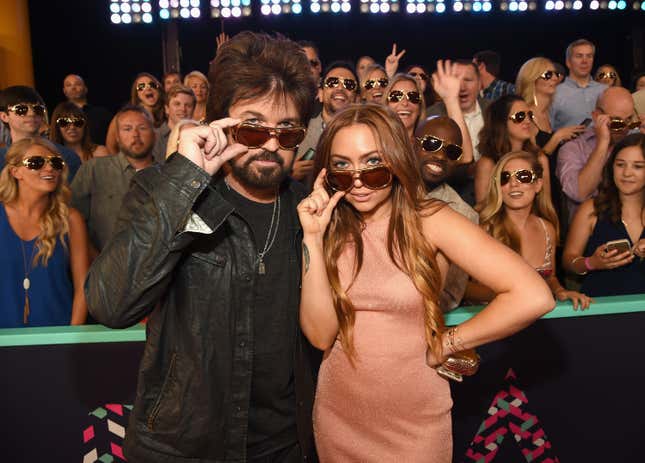
“I’ve always felt that country music tells it like it is,” one singer tells me. “It’s the everyman music.” I focus on smiling and nodding and not asking the nice singer if he’s happened to notice the absolute spectacle going on around us, the designer dresses swishing along the carpet behind him. “I talk to people after my gigs,” he continues, as if drafting his next song, “and they’re just normal people, working hard, spending their money to buy a cold beer and come out and listen to music—that’s what it’s all about. It really captures the heart of the American spirit and who people are. I feel like I’m one of those people, too.”
And look—maybe he is. Maybe they all are: the singers, the publicists, the members of the press holding their phones at arm’s length and spinning as if in a cinematic romance, pretending to talk to an audience of thousands while staring at their own powdered faces. Who am I to say? And who’s to say my own love of country music—even, occasionally, the puffed-up, watered-down kind playing on the radio—isn’t also a clichéd and fairly transparent bid for a kind of authenticity, a reminder (to whom?) of my blue-collar roots despite the prep school scholarships. I didn’t even grow up on the stuff, but came to it after college, driving up and down the continent like a character in a song. That summer was one story I wanted to tell myself about myself. Maybe country music is another.

Country is one of the stories America tells itself about itself, at any rate, the music a myth either stupid or villainous or saving, depending on who’s doing the telling. The best song I heard on my drive from Michigan to Nashville, amid eight hours of repetitive and repeatedly male-voiced hits, was Maren Morris’s “My Church,” a barnstorming single touting the open road and radio dial as a spiritual experience. “The best country songs describe the world not as it is,” writes Rob Harvilla of the song’s longingly old-school notes, “but as it was, or as it oughta be.”
“I don’t think it’s a country thing,” my boyfriend will say, back home, when I read this line aloud. “I think it’s a white-people thing.” Our art, like our kitsch and our politics, too often turns as it was into as it ought to have been or as we have rewritten it to be. In assessing Morris’s album, Molly Lambert points out the slippery appeal of this kind of art, worrying that both Morris—as packaged by a major label after 10 years in the trenches—and her music have succumbed to “the trap of nostalgia, an obsession with an idealized, impossible, hyper-authentic version of the past.”
It’s an easy trap to fall into; the Republican nominee is counting on great swathes of the country doing just that. Make America great again, he says, as if the answer lies in the misty past and not the hard, slow work of the present. As if greatness were a song we could play over and over again, as simple as hitting rewind, and not one we’re still struggling to write. “It’s just real,” one of my pink-carpet comrades gushes, about country music, and I’m reminded of the reasoning I hear from cousins, from friends of friends: He’s just real.
How far any given performance of authenticity will get you, I think, any shiny and insistent veneer of realness. I am interviewing singers in thousand-dollar suits who are here on this hideous carpet because they were very, very good at projecting that veneer to millions of viewers via a television show of the genre called reality, and it seems to me that if country music is a story we are telling ourselves, it’s currently an accurate and terrible one. It’s a story with few heroes and boring villains and an audience less interested in the world as it ought to be than the world as it is, only with better lighting and omnipresent cameras. Maybe we get the Top 40 we deserve, I think. Maybe country radio and country, the country, are interchangeable after all.
Chris Scruggs and the Stone Fox Five break into “If You’ve Got the Money, I’ve Got the Time,” and Tim and Jess rise to dance, goofy and sweet. Alone at the table, I scribble notes by the faint glimmer of the disco ball and the light crawling down the hallway from the front room, from the bar. The drinks are cheap, the band is brilliant, and everyone knows everyone else: it’s a place out of a song, the kind I wouldn’t mind living in. Another story to tell oneself—that such places exist, and that I could make a home in one—but this one’s real or feels that way, at least, to my road-weary, beer-warm mind.
I’ll have trouble expressing this, when I get home, and will make friends listen to endless reliving of quotes and moments as I attempt to get at the feel of the place, the texture of the evening. “Maybe authenticity is a matter of translation,” my boyfriend will say, meaning that anytime we put anything—a feeling, a thought, a longing—into words (or music), we necessarily lessen it. We can’t ever say what we really mean. The feeling might be as nuanced as the work of Brandy Clark or Ashley Monroe, but the best the expression can manage is Florida Georgia Line. (I’m pretty sure Wittgenstein said as much.) How incredible is it, then, that any song or book or painting manages even a modicum of what we, lacking better words, call authenticity?
The band takes a break, and we carry our beers outside so the smokers can smoke. (The Legion only recently became a nonsmoking venue, Jess tells me, marveling at the transparent air.) Tim asks if I know how Nashville got the nickname Music City. No, I say. I don’t know anything. The Fisk Jubilee Singers, he says, an all-black acapella group (from Fisk University, I’ll learn later, an institution dedicated to educating freed slaves after the Civil War), went on tour in the late 1800s, all over the country, even to Europe. There they sang before Queen Victoria, who was so awed by the beauty of their voices that she said they must come from Music City.
Tim smiles, and I scribble, and the others around us nod in the softly lit Nashville night—they know the story. True or not, it’s a good one. Sometimes, our myths are better than we know. The door behind me springs open, veering dangerously close to my beer, and Chris Scruggs himself leans out, apologizing.
“How do you do,” he says, lifting his tan hat. “Might you have seen my guitarist come through this way?” We haven’t, and Scruggs ducks back into the hall, taking his twinkling, old-fashioned mannerisms with him. His is another kind of performance, one done not for votes or fame and for very little money—the band passes the hat, back in the hall—but as homage, both part of and in service to the music he plays, music that might otherwise be lost to time.
“Good country is nothing if not mourning,” wrote the essayist Ander Monson, but I misremember mourning as regret, recalling the line from my bleacher seat at the CMTs. (The gauntlet of the pink carpet over, I find my place in the near-empty press rows to watch the show. I’m hungry and thirsty and tired of smiling, and the arena is freezing cold.) Neither mourning nor regret are anywhere to be found in the evening’s neon proceedings, and this fact strikes me not as a fluke, nor as the inevitable result of the genre’s silliest awards show, but as a wrinkle at the heart of mainstream country’s heartlessness, the reason so few of the artists performing this evening are liked or respected or of even mild interest to the country-loving musicians across the river.
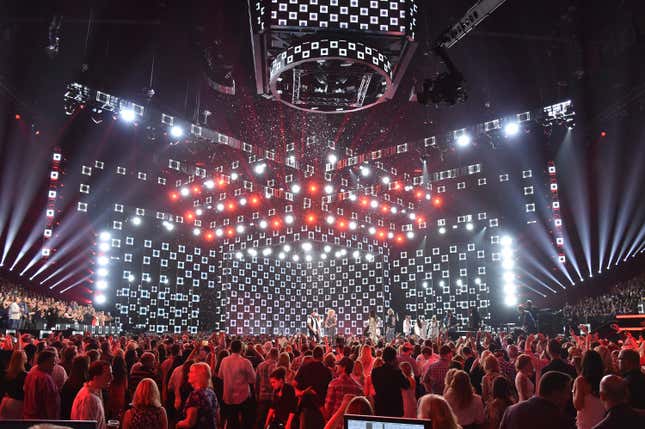
Both—mourning, regret—depend on time’s unforgivable passing, on the existence of a moment in which something changes, irrevocably, and on the thousand lesser moments that follow, that have to be endured. Mourning and regret depend on aging, and country radio, in its eagerness to out-pop pop music, has chained itself to an ugly, forceful, and unrelenting youthfulness. “Never grow up, never grow old,” sings the 48-year-old Keith Urban on the CMT-nominated “John Cougar, John Deere, John 3:16,” and he does so without a hint of Tom Petty’s rueful irony. Life, according to some facets of country radio, is a non-stop frat party, a starlit night on a riverbank, a couple beer-soaked hours and never paying the check. It’s all shots of whiskey and no hangover, all first kisses and no divorce.
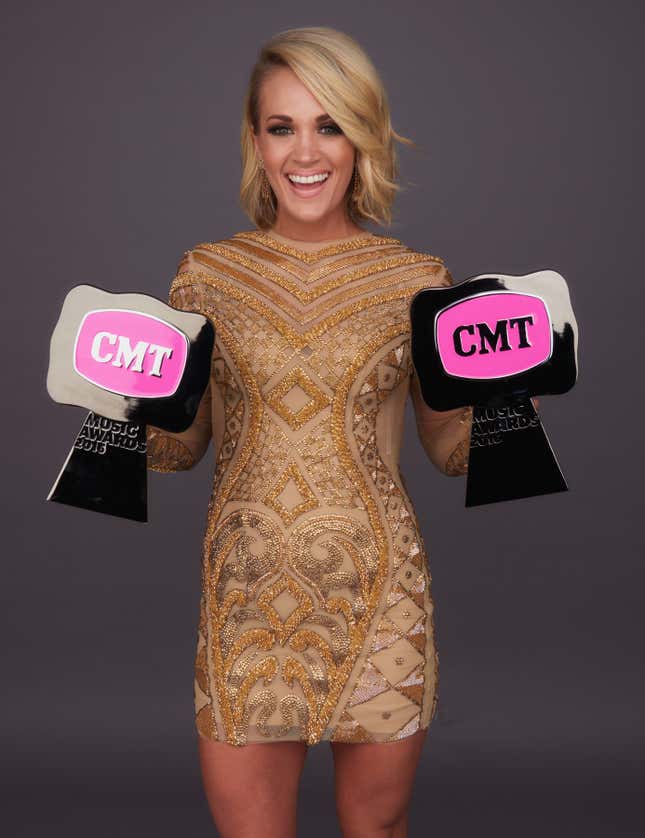
The CMT Awards show is an assault of middle-school humor, mediocre collaborations, and garish video backdrops; the awards themselves are oversized, bright pink belt buckles. I cringe with each announcement: “And the buckle goes to…!” The performances are an unfathomable selection of current hits, country and otherwise. “Bounce, bounce!” bosses Pitbull at one point, and the crowd obliges, kind of. Huge camera arms swoop overhead like pushy parents. The show is live, which means commercial breaks have to be endured in real time: the fact that we’re watching in person, not on television, doesn’t mean we get to miss out on the advertising. Over the speakers, a female voice thanks Kia, Pepsi, Liberty Mutual, and Garnier Fructis for their support of the CMTs. As each commercial break comes to an end, a harried male voice counts us down: “10, 9, 8…” and then, annoyed, “Applause, please, applause!”
The stars—Pitbull and his ilk—perform on a huge main stage that swoops out into the middle of the crowd; a smaller stage to the right (named the Firestone stage, no stone left unbranded) showcases emerging performers. I get mildly excited for Maren Morris, who belts her hit’s chorus—Can I get a hallelujah? Can I get an amen? / Feels like the Holy Ghost running through ya, when I play the highway FM / I find my soul revival, singing every single verse / Yeah, I guess that’s my church—to take us into a commercial break. But the chorus is all Morris gets to play; she fades out as the list of sponsors takes over. This is music reduced to function, a product or a distraction. I feel nothing in my body but the overactive air conditioning.
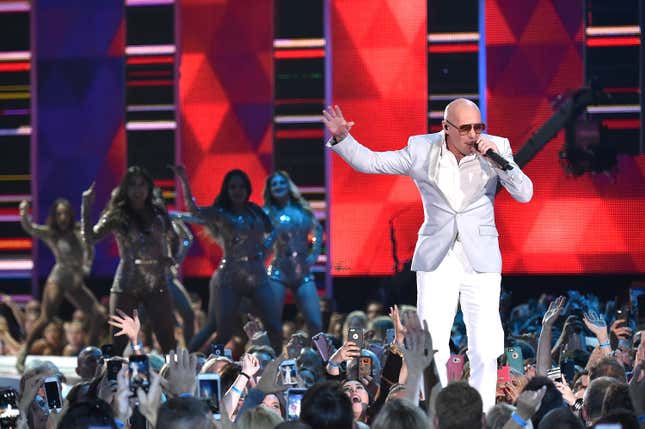
How do you do? Chris Scruggs had asked, and I could only smile, say hi. But I do just great, thanks. I do just fine. Back inside, the tiled floor and the muddled brown wood of the bar remind me of family gatherings—birthdays, anniversaries, wedding receptions—at a Knights of Columbus hall several states north of here. My nostalgia is layered, felt both for the childhood I had and for the one I didn’t, for the youth I’m still allowed to live: driving 500 miles in a day, for example, to spend the evening’s long hours in a new city, speaking with friendly, generous strangers and hearing for the first time music I could listen to forever. That is to say: it’s a really, really nice trap I’ve fallen into.
The existence of Post 82 and places like it serve as evidence of our ideals of community, even if we so often fail to live up to them. This particular place was built for those who travel across the world to fire guns at a faceless enemy in the name of a country that doesn’t have answers for the questions they come back carrying—and yet all are welcomed on Honky Tonk Night, asked only to sign the ledger, to be guests. American flags hang at intervals throughout the building’s two rooms, and I have the tipsy, dumb, unshakable thought that our nation is precisely as good and as bad as all of the music it makes, as various and indefinable.
In other words, Rebecca Solnit’s: “[T]he opposite is also true of almost anything you can say about this vast messy empire of everybody from everywhere that pretends to be a coherent country.” Or in other words, my own: Can’t any music—however clichéd it may be, however trite—if it catches us vulnerable, reduce us to our pleasure- or solace- or tear-seeking selves, making our bodies shake or sway? No wonder we try to label and contain it, this magic spell, this poison that slakes our thirst. A huge bald eagle is painted on the wall of the hallway that leads from the bar to the dance floor, the sky behind it emblazoned: In God We Trust. Somewhere beyond the mural, Chris Scruggs and the Stone Fox Five play the soundtrack to a past that never was, to a greatness that lies, if anywhere, ahead.
Yeah, I guess that’s my church.
“Is it authentic?” my old friend Wheeler Walker, Jr. scoffs. The enormous lights surrounding us glint in his sunglasses. (We are indoors.) I had to wade through blocks and blocks of lined-up fans to get into the arena, had to proffer my media badge like an apology to the cops guarding the closed streets, had to scoot through the barricades they eased open for me, had to walk the star-free carpet myself, searching for my spot—and the only thought in my head is what I would give to be back at the Legion, drinking a two-dollar beer. But this bright and desperate fakery is the reason I’m here, the fool’s gold behind which I spy the good stuff. I try to stand steadier in my boots and meet Walker’s gaze, such as it is.
“Who gives a shit?” he asks, rhetorically. “If you listen to it, and you get a reaction to it, that’s authentic, you know? Anybody singing these—” An outburst of cheers and applause down the carpet interrupts him. “Whoever they’re cheering for right now, I guarantee you, is not authentic, ‘cause that’s why they’re cheering, ‘cause it’s generic shit that they’re listening to. Anyway, I think it’s a dumb argument. I mean, I am from Kentucky, would it make me less legit it I was born in Cincinnati, an hour north? It don’t make a fucking difference.”
“But,” he adds, leaning in. “I do like to make fun of these fuckers who pretend to be authentic and ain’t.”
I wake before my alarm and drive home through central Tennessee and the sloping green of Kentucky; I dodge work sites around Cincinnati. I balance my notebook against the steering wheel to riff on Allen Ginsberg: America, you’re always under construction. A makeshift poem has been painted, yards-high, on a silo in southern Ohio: “JOHN 3:3 / PAINTS & / QUARTER / HORSES.”
I look up the verse when I get home. In it, Jesus confirms a follower’s belief that he has come from God: “Amen, amen, I say to you, no one can see the kingdom of God without being born from above.” A footnote explains that the Greek word anothen can mean both “from above”—as Jesus means it—and “again,” as the follower (and, I suspect, the silo-writer) interprets it. The two possibilities of the word lead to a misunderstanding—how can a person possibly be born again, the follower in the text asks—and then to a conversation rich with metaphor and philosophy, and then, centuries later, to a dogma. The once-dense and many-meaning word grows flattened and overused, a catchphrase worthy of country radio.
I’m not a scholar: I can’t be sure the particular brand of religion peppering my radio dial, more dominant than even the country stations, arises from this verse alone. But I know how we can cleave to perceived symbols of authenticity without ever knowing the story of their origins; we can forsake struggle and substance in favor of a facade of realness that can be bought and sold; we can live according to myths—national, spiritual, musical, personal—without ever considering the truths they claim to tell, nor the ones they actually do. We are not always honest with ourselves, as a nation. I know I am not, as a nation of one.
But the clouds are far away, faint and wispy in the blue sky over middle America, and I’ll be home in a few fast, aching, glass-clear hours. I roll the window down: a turn of phrase left over from another century, a refracted authenticity. I use it anyway. Turn the radio up, says the radio, and I let it have the last word.
Mairead Small Staid (@maireadsmst) lives in Michigan, where she is at work on a collection of essays.
